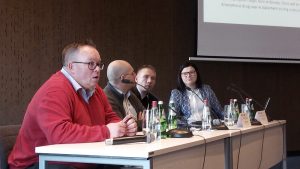On the margins of the dialogue between civil society and donors, representatives of the Open Society Foundations visited DPNSEE office on 18 January 2018: Daniel Wolfe, director of International Harm Reduction Development, Julia Greenberg, director of Governance and Financing, and Ekaterina Lukicheva, program officer for the International Harm Reduction Development Program (all three from the OSF Public Health Programme) along with Raminta Štuikyte, consultant. Vice-President Nebojša Đurasović, Secretary of the Board Denis Dedajić and Executive Director Milutin Milošević welcomed the distinguished guests.
DPNSEE hosts presented work and potentials of the Network and answered many questions. Guests were especially interested by the fact that DPNSEE gathers member organisations from all SEE countries and that it has a wide approach to the issue, including various elements of drug policy. They underlined that their full withdrawal from the region of Eastern Europe and Central Asia is not good so they decided to assign funds to it. In 2017, they already supported two CSO projects in Montenegro with and they still have funds for support to Bosnia Herzegovina, Romania and Serbia which were not distributed, while for 2018 they have planned additional support to the region. Agreement was reached, in principle, that DPNSEE will implement a project on budget advocacy and implementation in Serbia, on local and national level. DPNSEE also proposed such an initiative on the regional level. Discussions about potential cooperation extended throughout the next two days of meetings.
Before the meetings in Belgrade, OSF and GF representatives visited Montenegro to discuss implementation of the two project they finance since 2017 and preparations for the national project application to the Global Fund. Our member organisations Cazas and Juventas were involved in the meetings.
Representatives of Margina and Viktorija had working meetings with both OSF and GF representatives. Result of the meetings is that the same support as the one for Montenegro is proposed for Bosnia Herzegovina, for a similar project adjusted to the structure of the country. Two projects are foreseen: one on accreditation of the harm reduction services in the Republic of Srpska and other on social contracting in the Federation of BH. The trigger for this decision was presentation which Denis had as panellist.
The OSF visit ended with visit to the Drop-in for drug users and Shelter for sex workers in Novi Sad managed by Prevent. The visit was very effective, with excellent presentation of Prevent’s work and very emotional discussion with three sex workers in the Shelter. At the end the guests (including representatives of SWAN and Mama Cash foundation) haven’t made any concrete promise for support but they expressed their willingness to help finding donors. The visit should be used as a model for welcoming donors and convincing them to finance services.










